
Why do we need summer vocabulary lesson ideas for adult ESL?
When schoooooool’s NOT out for summer…
Well, across the country, students and teachers look forward to the school-free summer months, but for many adult ESL courses/classes, it’s business (or education) as usual. If that’s the case for you, consider trying out some of these summer vocabulary lesson ideas for adult ESL classes. After all, our childhood summers are nothing like the summers we have as adults, so introduce summer culture to your adult ESL students.
When a couple of my Saudi Arabian students told me their electric bill was over $500 for their two-bedroom apartment and it wasn’t even summer yet, I was shocked. Weren’t Saudis accustomed enough to heat to endure Oklahoma heat? Well, no. With electricity heavily subsidized by the Saudi government (back then anyway), Saudis blasted the a/c to enjoy frigid temperatures at a low price. I added “discuss utility bills” to my list of seasonal topics and marveled all over again at just how difficult it is to predict what our students need our help to understand.
What are some quick summer vocabulary lesson ideas?
Let’s go over how we can make summer a theme in vocabulary and grammar lessons, part of speaking practice in discussions, and more!
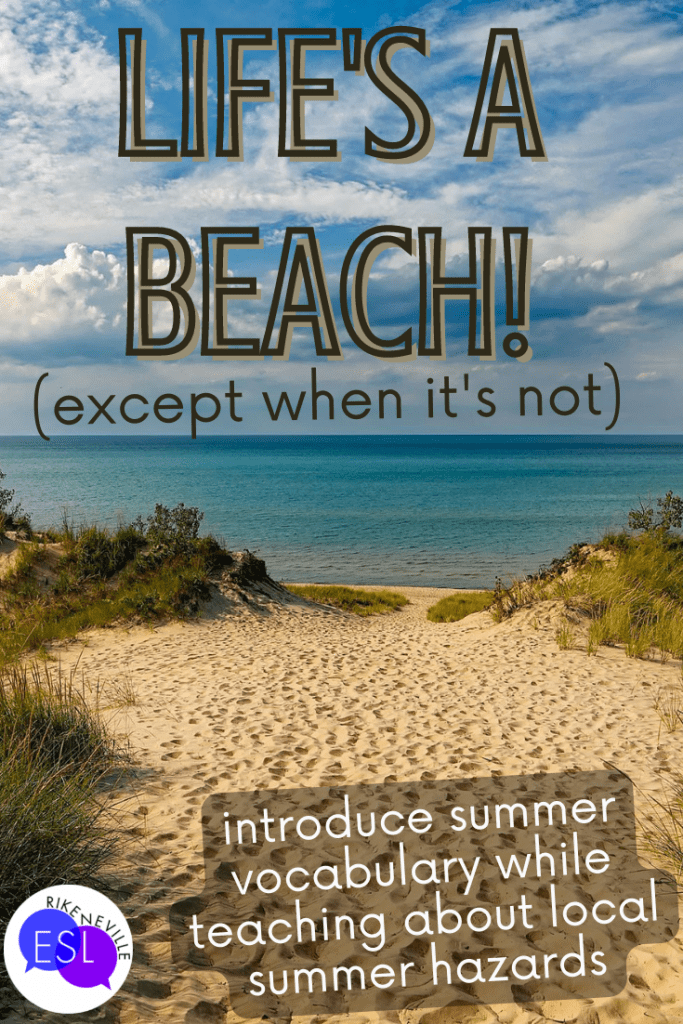
Life may be a “beach,” but what are some summer hazards?
Where are your students from? Does their summer weather back home compare to where they are now? If not, you might want to spend a lesson or two on some common summer hazards they might encounter in their new home city or state. Definitely teach “Leaves of three, leave it be” if it applies to your area.
Give them the summer vocabulary they need for seasonal hazards.
Insect identification? This might sound like a typical ESL lesson for kids, but adults need to know some key insect terms, so put those bugs into your summer vocabulary lessons. Think how chiggers, ticks, mosquitoes, and cicadas can affect your adult learners.
Make sure your students know the vocabulary related to and the signs of heatstroke as well as heat exhaustion and any common mosquito-borne viruses or tick diseases local to your area.
Words they might hear during weather forecasts that they need to pay attention to could include heat dome, tropical storm, humidity, heat index, heatwave, flash flood, drought, wildfire, grass fire, high winds, and burn ban.
Throw some hazardous summer vocabulary into grammar lessons.
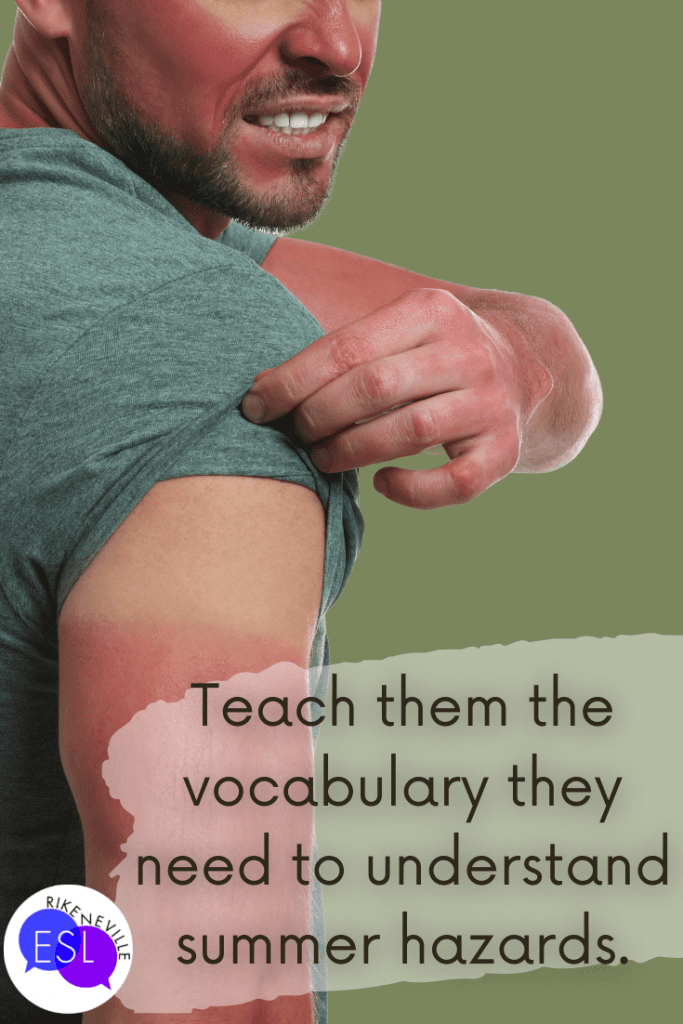
You can introduce some summer hazards as collocations such as
- get a sunburn
- apply sunscreen
- become dehydrated
- stay hydrated
- suffer from heat exhaustion
A few verbs that immediately come to mind are sweat, overheat, blister, sizzle, and itch. You want nouns? How about dehydration, food poisoning, melanoma, and carcinoma? Adjectives? Oppressive, muggy, blazing, cloudless, refreshing, scorching, shaded, and stifling. Obviously, I didn’t think of very many positive ones as I sit here in my own sweat, but you get the idea.
Teach summer vocabulary for sun-drenched days of fun!
I think that childhood memories of summer are often the polar opposite of the adult experience of summer, but still, summertime fun isn’t just for children. Give your adult ESL students some ideas of what they can do for fun whether with other adults or with their families.
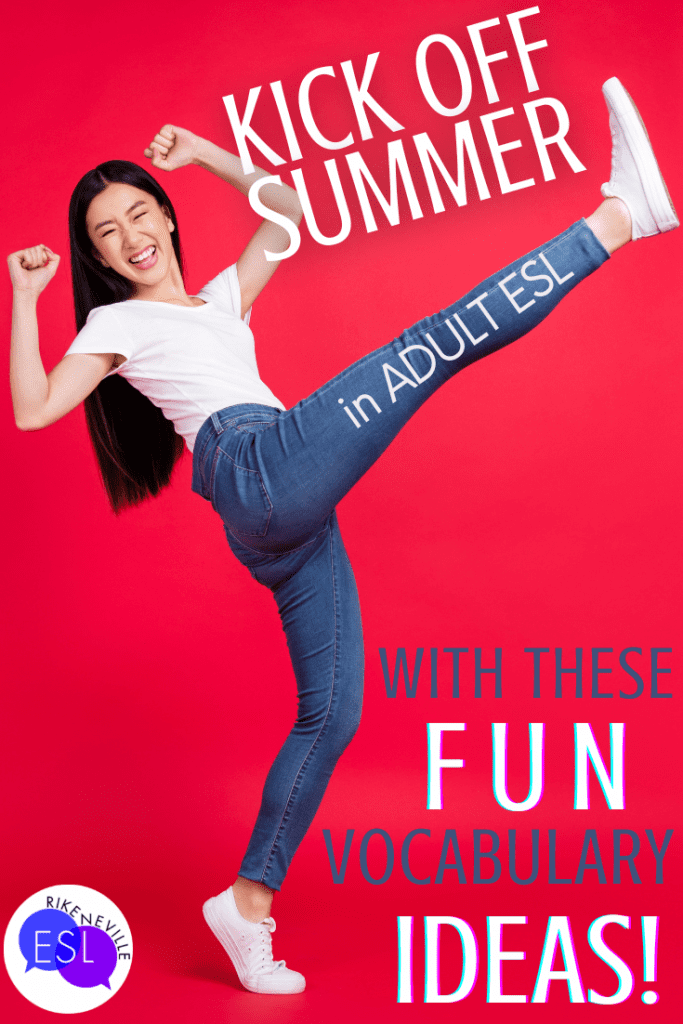
Inject summer vocabulary for fun activities into your regular classes.
For outdoor fun, your adult ESL students have a myriad of options, and you can introduce these activities via verb-noun collocations.
- host a potluck barbecue
- enjoy an outdoor concert
- go for a hike, go to the beach, go to an amusement park
- hang out at a community pool
- take a road trip
If keeping cool outside is a concern, suggest other activities via collocations.
- cool off with a water balloon fight
- go to a water park
- support a lemonade stand
- run a lemonade stand
Now, I don’t know about where you are, but in Oklahoma, the heat can get so oppressive that spending time outdoors is best as late in the evening or as early in the morning as possible, as permitted by local mosquitoes. This is the time to talk about ways to slow down and keep cool(er) in the summer while still spending time outdoors.
- watching fireflies, watching the sunrise
- relaxing in a hammock
- sitting on a porch swing
- gazing at the stars

These might all sound like obvious summertime activities to you, but remember that your students may have never experienced summer heat to the degree it is where they are now, or they may have grown up having access to completely different kinds of activities.
Include summer vocabulary for fun indoor activities in your regular classes.
If your adult ESL students don’t have or can’t afford air-conditioning, they’ll likely appreciate learning and talking about ways to keep cool indoors. Help them discover any free or low-cost museums in the area. Turn them into library fans. Some larger cities may offer cooling shelters, so make sure your students know how to locate them in case they need one.
Add summer vocabulary for its own sake.
Summer-themed vocabulary doesn’t have to be paired with something else. You can make it more of the star of its own show with typical ESL themes.
When it’s hot-hot-hot, what do you eat?
Food is a reliably relatable topic, and learning about the summer foods enjoyed in different cultures can lead to lots of discussions, recipe exchanges, and maybe even some impromptu get-togethers to share summertime food. In my part of the country, people swear by watermelon as a cool, refreshing treat. Because cooking in your kitchen heats up your home, many like to grill, well, pretty much anything outside.

Whether you get your students to do a presentation on a summertime food from back home, a demonstration on a recipe they’ve just learned, or have them do a how-to writing assignment, thoughts of food might be the perfect distraction from the summer heat.
Encourage them to venture out when they hear the ice cream truck and practice their English to order some ice cream (to enjoy indoors, perhaps in front of the a/c or a fan). Challenge them to find and follow a recipe for making their own homemade ice cream.
Who wears short shorts? We wear short shorts.
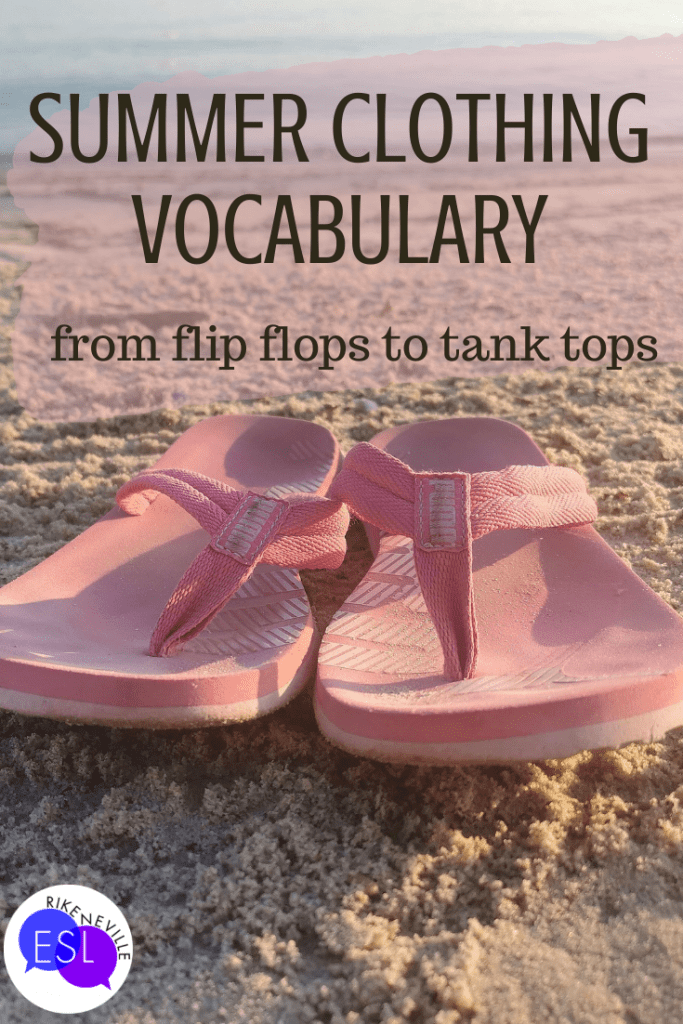
If you’ve got a clothing unit coming up, go all out on the summertime clothing vocabulary. From sandals to wide-brimmed hats, flip flops to tank tops, expose them to some more specific terms than just shirts and shoes.
While you are at it, add in some descriptive language like loose-fitting, airy, oversized, moisture-wicking, sleeveless, skimpy, rolled-up, barely-there, and strapless. Don’t forget barefoot!
This is a good time to discuss some social norms for appropriate summer clothing. Perhaps give your more conservative students a heads up about sights that may shock them. For example, they may see people walking into some stores or restaurants while wearing a bikini if that’s normal for your area. Or perhaps they are accustomed to going everywhere barefoot. Let them know where footwear might be required. Be sure they know what an invitation to go skinny-dipping entails.
Try using a perpetual favorite–idioms–to teach summer vocabulary.
Idioms pack a ton of meaning into just a few words, and we use them far more than we realize. Here are just a few that are summer-related.
- to have a summer fling
- to be in the dog days of summer
- to soak up some sun
- to be a ray of sunshine
- to be fresh as a daisy
- to be hot under the collar
- a day at the beach
I hope you are excited to try some of these ideas for incorporating summer vocabulary. Let me know how it goes with your students, or drop a line to tell me your ideas! ^_^
In the meantime, if you are looking for something pre-made to use with your students, like a printable/digital hybrid bundle or a bundle of boom cards, check the resources below. Not summer where you are? You might want to read one of these:
- Fall ESL Activities: 5 Simple Ways to Invoke the Spirit of Autumn
- Winter Activities: The Best Idea I Ever Had for Adult ESL Classes
- 9 Delightful Springtime Activities for Adult ESL Classes
Summer Vocabulary Resources
Please note that there are two different bundles. The first is only for the printable/digital hybrid resources. You’ll get a digital presentation, bingo, and worksheets. Have you tried out Easel by TpT? You’ll find some included versions! Prefer Boom Cards? Check out the second bundle!
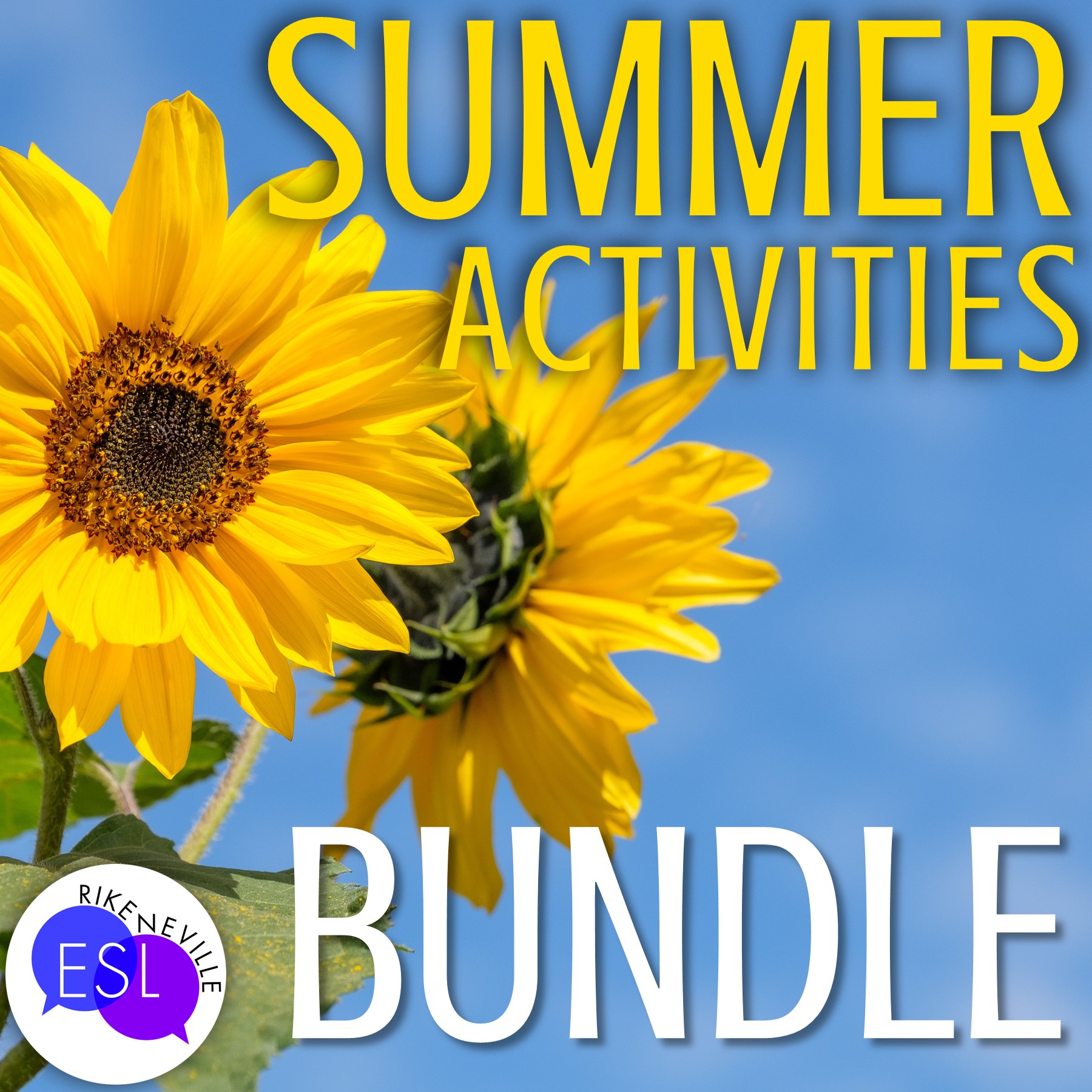
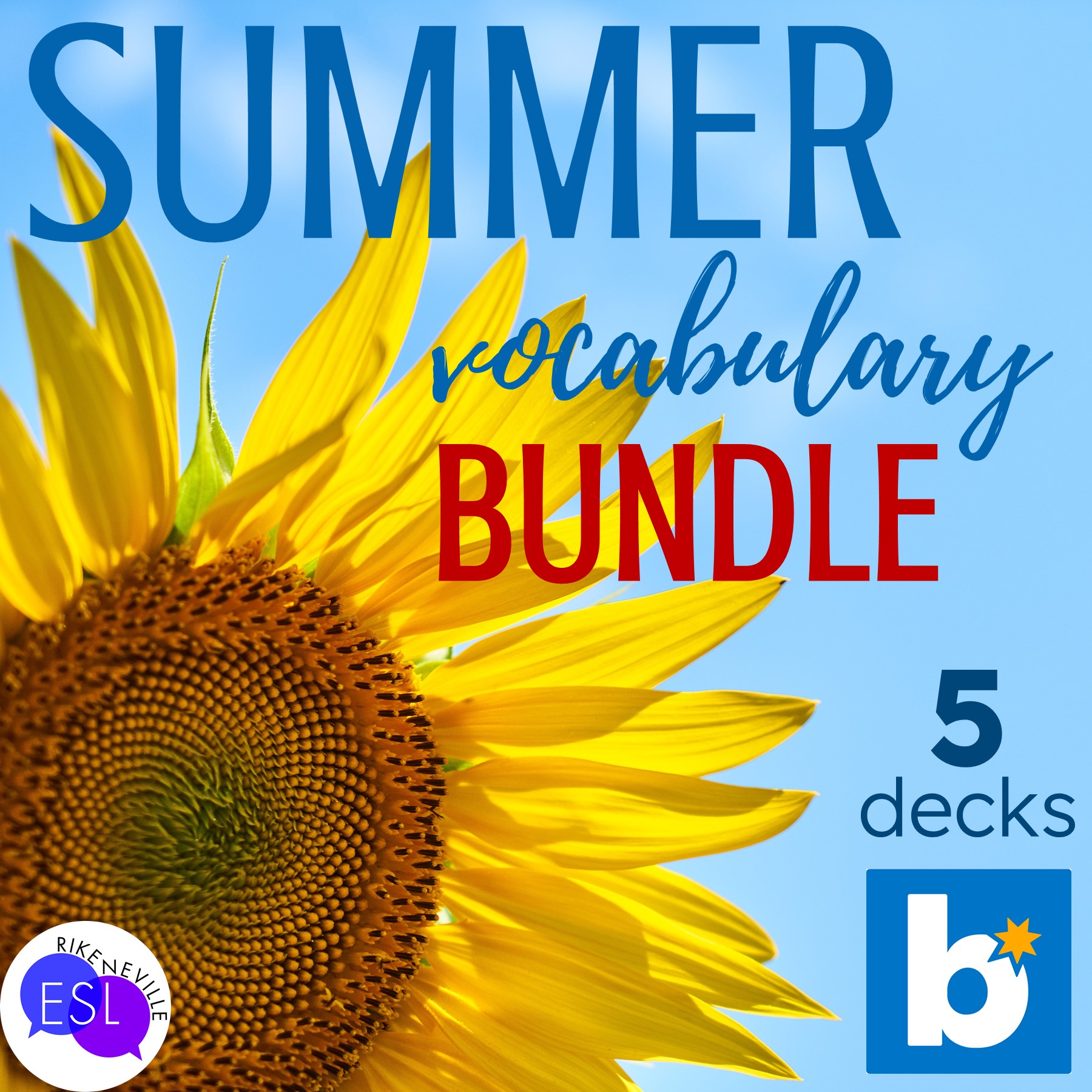
Need something for another season? Grab my TpT mega seasonal bundle or my BOOM mega seasonal bundle.

Leave a Reply